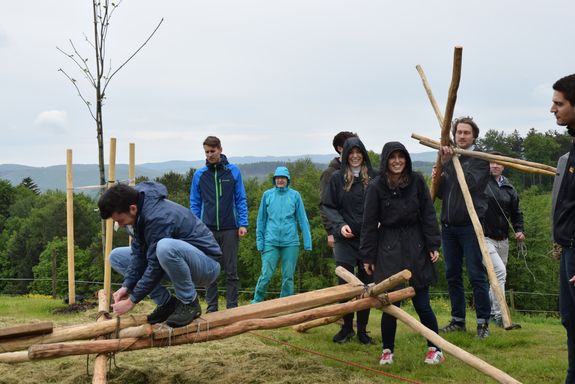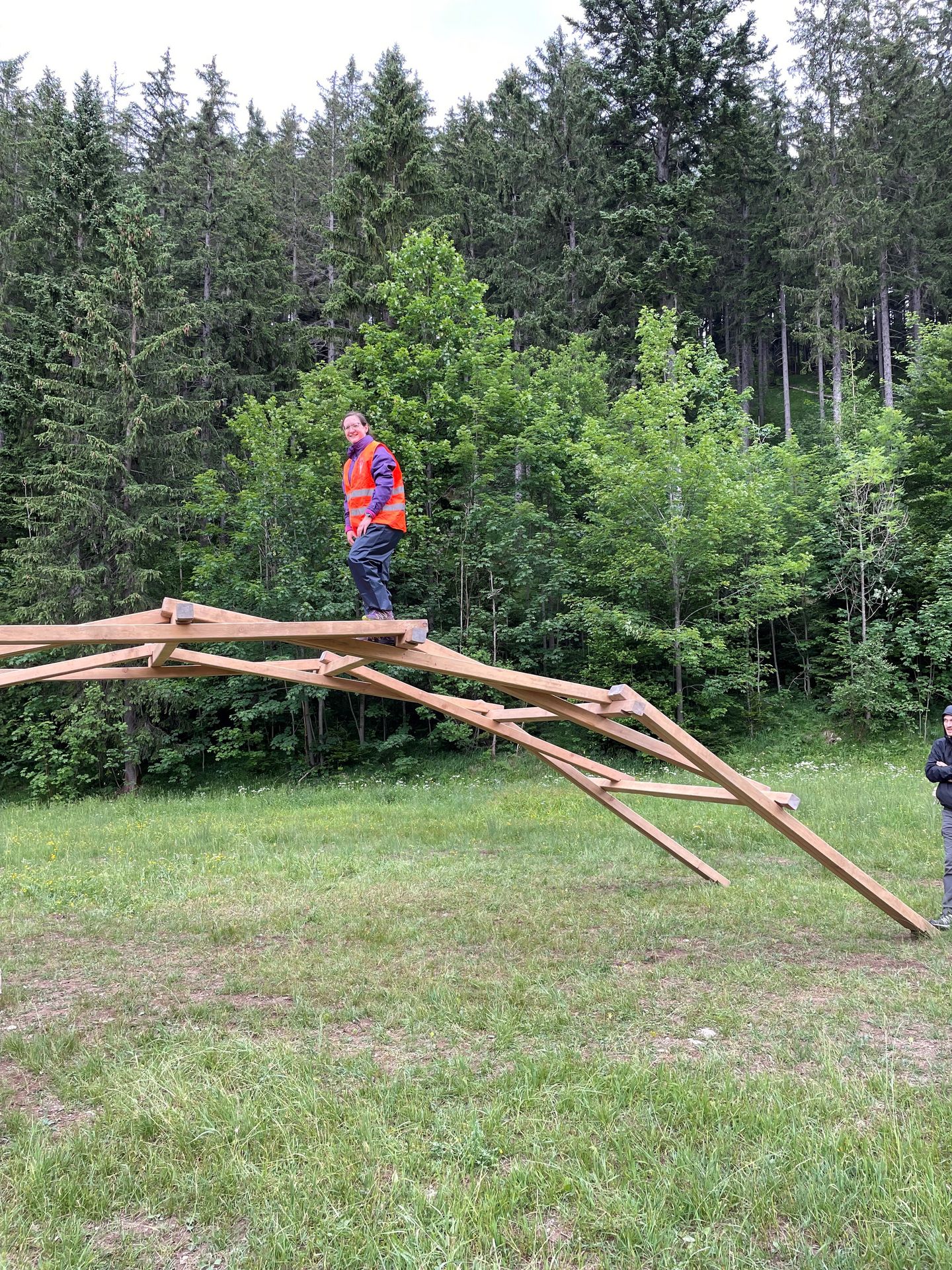Leo Flammer
![[Translate to English:] Leo Flammer](/fileadmin/_processed_/1/c/csm_Leo_Flammer_LeadershipRetreat_4068f58863.jpg)
![[Translate to English:] Leadership](/fileadmin/_processed_/4/8/csm_AdobeStock_294231298_27eac7f4c8.jpeg)
The "High Impact Leadership Development Program" at TU Wien helps you transition from a specialist to a leader, motivates your team, and manages change processes while strengthening your leadership skills.
✓ Strategic Priorities: Develop targeted strategies for your organization.
✓ Motivating Teams: Inspire your team and strengthen collaboration.
✓ Change Management: Guide your team smoothly through change processes.
✓ Organizational Dynamics: Understand structures and make well-informed decisions.
✓ Leadership Skills: Utilize practical knowledge and tools for effective leadership.
In a dynamic professional environment, not only technical expertise but also excellent leadership skills and an authentic leadership style are essential. Developing knowledge in leadership and modern management is crucial for effectively leading teams and having a positive impact on organizational culture.
The "High Impact Leadership Development Program" at TU Wien offers comprehensive training specifically designed to help you transition from a specialist to an effective leader. Through a combination of theoretical knowledge and practical exercises—both indoors and outdoors—you will acquire solid leadership knowledge that can be immediately applied in your professional life. Experience how strategic prioritization, team motivation, and effective leadership through change processes enable you to master your professional tasks and advance your career.
In small groups of 12 to 18 participants, leaders are provided with a personalized learning environment that allows for intensive coaching and individual feedback. Various training formats and programs are available, enabling leaders to authentically develop their skills and leadership styles. Through this targeted support, you will experience practical and specialized further education led by top-notch instructors with deep expertise in areas such as corporate management, coaching, and change management.
The hands-on exercises and on-site simulations ensure that the knowledge and skills acquired are deeply embedded in your professional context. Additionally, upon completion of the program, you will receive a certificate of participation from TU Wien and a diploma worth 12 ECTS credits, supporting your professional development and providing you with valuable recognition on both an academic and professional level.
| Degree: | Certificate from TU Wien and the possibility of credit transfer towards the Executive MBA Management & Leadership Programs |
| Language: | Optional German & English (Details under "Dates") |
| Didactics: | Small groups of up to 18 participants | Theory, group dynamic exercises (indoors and lightly outdoor), case studies, simulations, reflections, and discussions. |
| Place: | Seminar hotels around Vienna |
| Program Fee: | € 6,590 |
Unleash your potential as a leader by mastering the three value chains 'EEE': Execution, Engagement, and Enhancement (at both the employee and organizational levels):
Our "High Impact Leadership Development Program" is tailored for ambitious individuals looking to position themselves or advance in the field of leadership and management. The program is primarily aimed at individuals in companies seeking to drive their organizational development and prepare their leaders for modern challenges.
Leadership training is crucial for the personal and professional development of leaders. It offers the opportunity to enhance leadership skills, develop individual abilities, and foster exchange with other leaders.
(Aspiring) Leaders: You are transitioning from a specialist to a leadership role and want to familiarize yourself with the new demands and challenges of this position. The intensive training helps you develop the necessary leadership qualities and apply them immediately in your new role.
Managers and Senior Executives: In mid-to-senior leadership positions, you are looking for opportunities to sharpen your strategic skills and lead teams more effectively. Our program provides practical exercises and theoretical foundations to help you set and execute strategic priorities.
Career-Oriented Professionals: You are looking for high-quality educational opportunities to advance your career. With our top-notch instructors and comprehensive curriculum, you will gain the tools to successfully navigate complex organizations and manage change effectively.
Network-Oriented Leaders: Building and expanding your professional network is of great importance to you. Through the program, you will work closely with like-minded individuals and experts, benefiting from personalized feedback and intensive coaching.
Adventurous and Practical Learners: You have an open mindset toward hands-on learning methods, including outdoor activities. The combination of indoor and outdoor exercises ensures an excellent integration of theoretical knowledge and practical experience.
Your TU Wien Academy for Continuation (ACE) Benefits:
Three training blocks, each consisting of three full-day training sessions (09:00 AM - 06:00 PM).
In the winter semester of 2026, we will offer the compact program in English:

Learn in small groups of 12-18 participants.

Practical content through group dynamic exercises (both indoor and with light outdoor elements), case studies, and simulations.
Our participants have recorded their experiences for you.
![[Translate to English:] Leadership Impression](/fileadmin/_processed_/d/d/csm_Langegger_Leadership_Retreat_2021-08_b5586910ed.jpg)
"Theory is accompanied by exciting outdoor exercises. We often fail, but that's part of the learning process. We learn what leadership means in theory and then immediately try to put it into practice. The growth of our group is especially evident during the voluntary after-work sessions. After a long and exhausting day, almost everyone still takes the time to listen to a one-hour talk on nuclear energy and actively engage in discussions.
The three weekends left a lasting impact on all of us. The subsequent personal reflection was crucial for understanding where there is room for improvement and recognizing the opportunities that the newly acquired knowledge presents."
Eileen Langegger | Senior Engineer, DMT Group
Linkedin, opens an external URL in a new window

"I particularly enjoyed the combination of outdoor exercises and classroom training. The exercises created a common framework that we could discuss further. This approach allowed the group to collaboratively develop the knowledge that was meant to be conveyed, making it much more memorable than if it had been taught in a traditional lecture format.
I found it enriching to work with like-minded, motivated colleagues on various tasks, building numerous bridges both literally and figuratively. Friendships were formed, and interactions were always at eye level. The exchange among participants encourages you to scrutinize your own views, question your decisions, and reflect on your leadership style. This fosters self-reflection and self-awareness. Additionally, it's helpful to see that all colleagues face the same challenges, regardless of the field they are working in."
Victoria Mohr | QMS Onboarding Specialist, Thermo Fisher Scientific
Linkedin, opens an external URL in a new window
![[Translate to English:] Participants sitting in circle outdoors having lunch](/fileadmin/_processed_/f/d/csm_Drennig_Claus_Leadership_Retreat_Mariazell_2021_86767b29b3.jpg)
"A very positive aspect of the seminar was, of course, the opportunity for interaction and the ability to ask questions and engage in discussions, complemented by outdoor elements that added variety and provided several 'aha' moments. I also found the slightly different didactic approach, without PowerPoint support, to be extremely pleasant and refreshingly varied.
From my perspective, the group of participants turned out to be relatively young; with about four or five others, I am probably among the older participants. However, this did not detract from the experience in any way. The diversity in content and personal perspectives made the group interesting, without any significant disharmony arising so far.
I found the second seminar in Puchberg am Schneeberg to be very pleasant; the location was excellent, and the large outdoor game was fantastic. All of this contributed to a great group dynamic, and everything was always followed by a thorough analysis phase, which really rounded things off."
Claus Drennig | Sales Manager Austria/Switzerland, Alfen
Linkedin, opens an external URL in a new window
Yes, the program is designed for aspiring and current leaders and managers at all levels who wish to delve deeply into leadership and management. It is particularly suitable for individuals transitioning from a specialist role to a leadership position.
The required preparation time varies depending on individual progress and personal commitment. We recommend dedicating an additional 10-15 hours per week for self-study and practical application of the learned content, alongside attending the program.
The "High Impact Leadership Development Program" at TU Wien equips you with essential tools to clearly distinguish yourself as a leader. You will learn practical leadership strategies that enhance your ability to motivate teams, manage change effectively, and achieve strategic goals.
These skills make you indispensable in your industry, significantly increasing your chances for promotions and improving your position in the job market. Additionally, you benefit from a recognized qualification and a valuable network that sustainably supports your professional development.
Take the opportunity to acquire practical knowledge and valuable tools that you can apply directly in your professional life. Enroll now in the High Impact Leadership Development Program and secure your place in an intensive, tailored training experience.